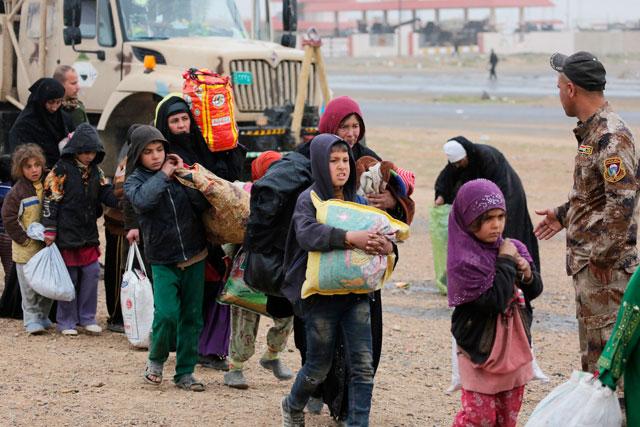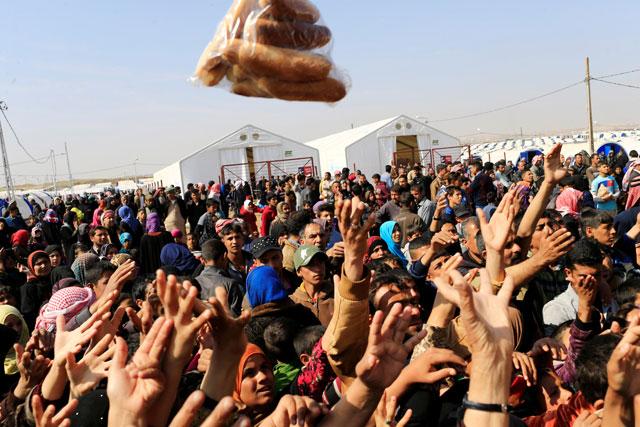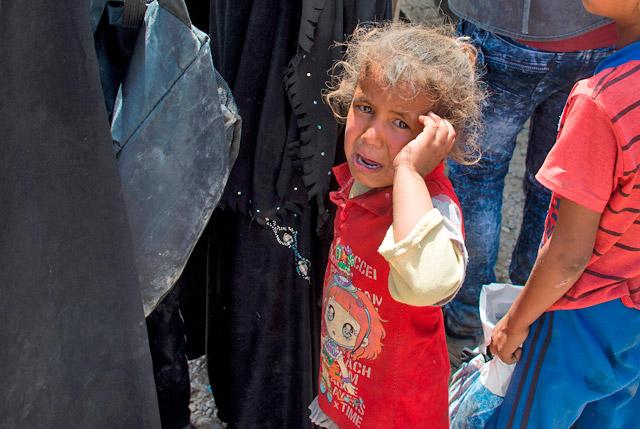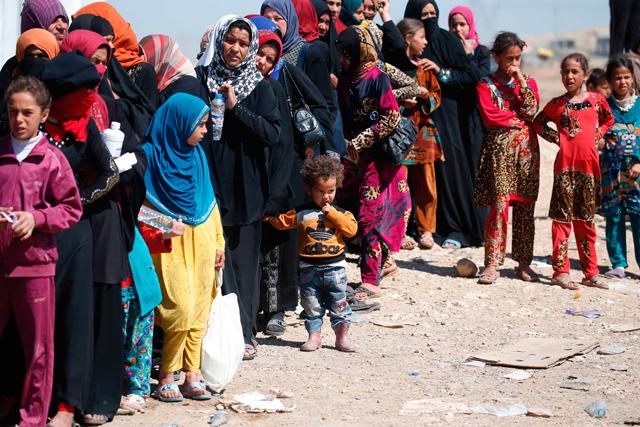You are here
Hungry and afraid, Mosul civilians flee
By AFP - Mar 02,2017 - Last updated at Mar 02,2017

Iraqi civilians, fled from clashes between Iraqi Army and Daesh terrorists, wait to be sent to refugee camp in Hamam Al Alil town, as the operation to retake Iraq’s Mosul from Daesh terrorists continues in Mosul, Iraq, on Thursday (Anadolu Agency photo)
HAMAM AL ALIL, Iraq-The gunshot rang out as civilians tried to escape the west of Mosul, where Iraqi forces are battling extremists, killing a father as he fled with his family.
“The sniper shot him in the head. His family was all around him, the children and his wife, they were crying,” said Maysun, who saw the shooting as she fled Mosul’s Maamun neighbourhood.
“They didn’t want to leave his side, but we made them continue because it was so dangerous,” the 35-year-old told AFP at a camp for the displaced near Iraq’s second city.
More than 28,000 people have streamed out of west Mosul since February 19, when security forces began a push to wrest control from the Daesh terror group, according to International Organisation for Migration figures.
They are fleeing fighting and food shortages, but they face horrifying scenes as they leave.
“There were bodies in the street as we walked, children, pieces of bodies,” said Safana, 23, as she waited in a food distribution queue in the Hamam Al Alil camp.
She said Daesh fighters had told people to leave her neighbourhood of Maamun in west Mosul.
“They came in the morning and said if we hadn’t left by evening they would kill us,” she said, adjusting her yellow headscarf.
Iraq’s elite Counter-Terrorism Service has faced “fierce” resistance from Daesh in southwest Mosul, and the extremists have targeted fleeing civilians, according to senior commander Staff Lieutenant General Abdulghani Al Assadi.
Heartbroken
He told AFP around 15 fleeing civilians had been killed by extremists in the past 10 days, with more wounded.
Safana, who like many of those fleeing Mosul declined to give her family name, said civilians had been trapped in their homes during heavy clashes.
“Our neighbour’s house was hit by a mortar round and the whole house collapsed on top of them.”
“We managed to pull out two wounded people,” her sister Shaimaa interjected.
“But all the rest were dead, and their bodies are still under the rubble.”
Among those killed elsewhere in the area known as the Maamun Flats was 10-year-old Rusud Saddam, whose mother was inconsolable as she walked along a highway to reach transport to a camp for the displaced.
“My daughter was standing in the corridor in the house... the mortar round hit and she’s gone,” she wept from behind a black face veil.
“They broke my heart... I left her in the cemetery. I left her in the cemetery and I came.”
Some of the displaced were moving from areas already under Iraqi military control, afraid of the ongoing fighting and eager to move to safety.
Others escaped across the front line, waiting until they saw Iraqi forces in the distance and running towards them with white flags.
‘Physical, psychological trauma’
At the Hamam Al Alil camp, 4,000 tents have been put up to receive arrivals, and more than 14,000 people have already been registered, said administrator Nader Samir.
He said the camp, run by a local NGO with UN support, was struggling with several basic problems, however.
“Our major need is for medical treatment. We don’t have any capacity and we have yet to get a response from the government on our request for help,” he told AFP.
He said the camp also had no electricity, because funds for a generator and fuel have yet to be released by the government.
Dozens of men and women were lined up at the camp in separate queues, waiting for food being distributed by the Norwegian Refugee Council.
Many of the displaced described surviving on a single meal a day.
“We had virtually no food and Daesh fighters came into our house and took what we had left,” said Khaled Mohamed, 24, using an Arabic acronym for ISIL.
“I’m afraid for my relatives who are still inside, I don’t know if they will be killed.”
Samir said civilians were arriving hungry, thirsty and traumatised.
“They’re suffering physically and psychologically, from what they’ve seen — torture, executions, death.”
Related Articles
HAMAM AL ALIL, Iraq- A sea of tents stretches to the horizon at a camp for displaced near Mosul but Ahmed Hassan says he and 17 relatives ha
HAMMAM AL ALIL, Iraq, — Fear and hunger are driving an ever-growing number of Iraqi civilians into a camp in Hammam Al Alil, where they shar
HAMMAM AL ALIL, Iraq — The fighting in west Mosul has forced up to 15,000 people to flee their homes every day recently, straining humanitar














